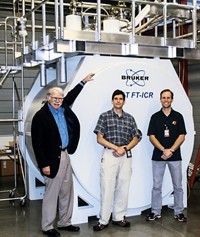Advertisement
Grab your lab coat. Let's get started
Welcome!
Welcome!
Create an account below to get 6 C&EN articles per month, receive newsletters and more - all free.
It seems this is your first time logging in online. Please enter the following information to continue.
As an ACS member you automatically get access to this site. All we need is few more details to create your reading experience.
Not you? Sign in with a different account.
Not you? Sign in with a different account.
ERROR 1
ERROR 1
ERROR 2
ERROR 2
ERROR 2
ERROR 2
ERROR 2
Password and Confirm password must match.
If you have an ACS member number, please enter it here so we can link this account to your membership. (optional)
ERROR 2
ACS values your privacy. By submitting your information, you are gaining access to C&EN and subscribing to our weekly newsletter. We use the information you provide to make your reading experience better, and we will never sell your data to third party members.
Analytical Chemistry
Inside Instrumentation
TECHNOLOGY AND BUSINESS NEWS FOR THE LABORATORY WORLD
by Celia M. Henry and Ann M. Thayer
April 11, 2005
| A version of this story appeared in
Volume 83, Issue 15
ESA Biosciences and 12 academic research institutions have received grants under NIH's Roadmap initiative to develop metabolomics technology. ESA will use its $538,000 in funding for the first year to extend and integrate electrochemical and mass spectrometric technologies for metabolomics studies. Metabolomics is the study of an organism's low-molecular-weight molecules or metabolites to understand and detect differences between normal and diseased states. "The challenge of metabolomics is that there are so many different metabolites occurring over an extremely wide concentration range," explains Paul Gamache, ESA director for applications development and support and principal author of the grant application. "As a result, no one technology can completely address the metabolome." ESA will work with collaborators, including Oak Ridge National Laboratory, Applied Biosystems/MDS SCIEX, Millennium Pharmaceuticals, Cornell University Medical School, Massachusetts College of Pharmacy, Boston University Medical School, and Burke Medical Research Institute.
U.S. Genomics has introduced its trilogy 2020 Single Molecule Analyzer, a benchtop platform that detects and quantitates individual nucleic acid molecules. The technology combines microfluidics, optical engineering, and labeling strategies to eliminate the need for amplification. The first application for the instrument is the direct detection of microRNA molecules, which are short RNA molecules that play a role in cancer and other diseases. In this assay, the target molecule is the only one in the sample that will hybridize to both of two fluorescently labeled probes added to the sample. After hybridization, the sample is directed through microfluidic channels into a glass capillary where multiple lasers excite the probes. Only doubly labeled micro-RNA molecules are counted. The system accommodates 96- and 384-well plates and up to 2,000 samples per day.
Thermo Electron has bought niton LLC for approximately $40.5 million in cash. NITON is a provider of portable X-ray analyzers for the metals, petrochemical, and environmental markets. It had revenues of $36 million in 2004. "NITON helps Thermo bring a traditional laboratory-based analytical technique to settings outside the laboratory," says Marijn E. Dekkers, president and chief executive officer of Thermo Electron. NITON, which is headquartered in Billerica, Mass., will become part of the Scientific Instruments product line of Thermo's Life & Laboratory Sciences segment.
Beckman Coulter's first product in its new line of ProteomeLab partitioning systems and chemistries for isolating and analyzing protein-based biomarkers is the IgY-12 Proteome Partitioning Chemistry. Based on avian-generated antibodies bound to inert beads, IgY-12 liquid chromatography and centrifugation spin columns can selectively partition the 12 most abundant proteins, which make up as much as 96% of the protein mass, in human serum or plasma. The resulting enriched samples, which include medium- and low-abundance proteins, are targets for biomarker discovery.
Combisep, a developer of multiplexed absorbance-based capillary electrophoresis instruments, has named Mark F. McDonald, 54, to the new role of chief operating officer. McDonald is currently president of Rheodyne, a manufacturer of high-performance liquid chromatography sample injectors and multichannel degassing devices. Separately, Agilent Technologies has promoted Rick Burdsall, 42, to vice president and chief information officer. Burdsall replaces Marty Chuck, who left Agilent earlier this year.
Waters Corp. has entered a Cooperative Research & Development Agreement with the U.S. Environmental Protection Agency's Region 5 Central Regional Laboratory in Chicago to create mass spectral libraries of more than 200 water-soluble organic compounds that aren't amenable to detection by gas chromatography coupled with mass spectrometry. The libraries will be generated with data from Waters' Alliance HPLC system combined with either its Micromass ZQ mass spectrometer or the Micromass Quattro micro API mass spectrometer. The compilation will help local officials as they respond to contamination and perform routine environmental analyses.
In other environmentally related activities, Waters sponsored its inaugural Environmental Summit last month in Manchester, England. Waters senior executives met with industry leaders to discuss the use of technology in environmental monitoring. The program also included environmental experts Larry Zintek from EPA, Damia Barcelo from the Spanish National Research Council, and Bert van Bavel from Örebro University, in Sweden, discussing future directions in environmental regulations.
Inside Instrumentation is written by
Advertisement





Join the conversation
Contact the reporter
Submit a Letter to the Editor for publication
Engage with us on Twitter